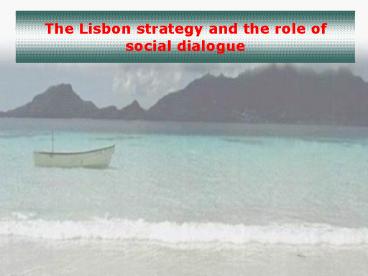Quest ce que le dialogue social - PowerPoint PPT Presentation
1 / 18
Title:
Quest ce que le dialogue social
Description:
(job losses, territorial impact, sectoral impact) at short term ... Subsidiarity. Legislation. Employment strategy. Social dialogue. CSR. Restructuring Forum ... – PowerPoint PPT presentation
Number of Views:67
Avg rating:3.0/5.0
Title: Quest ce que le dialogue social
1
The Lisbon strategy and the role of social
dialogue
2
Change?
3
Employment trends
In of total employment in the EU
- Effects
- Negative(job losses, territorial impact,
sectoral impact) at short term - Positive (competitiveness, productivity, growth)
at medium term - Not a transitional phenomenon but a structural
evolution Service revolution
4
Addressing change
5
EU Approach
Framework conditions
Manage Change
Lisbon Strategy Common values to
address Globalisation Subsidiarity
Social Agenda
Strategy
Industrial policy Energy policy Competition Struct
ural policy European Structural FundsEGF
Legislation Employment strategy Social
dialogue CSR Restructuring Forum Monitoring (EMCC)
Tools
6
Legislation
- Labour Law
- Environmental Law
- Competition Law
- Commercial Law
- Company Law
- Etc.
- Transfers of undertakings
- Collective redundancies
- Employer insolvency
- European Works Council
- Information and consultation of
- employees
Reminder National law also applicable
7
Objectives, Structural Funds and instruments
2007-2013
Objectives
Structural Funds and instruments
ERDF
ESF
Cohesion Fund
Convergence
Regional competitiveness and employment
ERDF
ESF
European territorial cooperation
ERDF
infrastructure, innovation, investments etc.
vocational training, employment aids etc.
Environmental and transport infra-structure,
renewable energy
8
European Social Fund - Good Governance
- Social partners are privileged actors in ESF
- An appropriate amount of resources to support
Social Partners in two kinds of activities (Art.
5) - Capacity building activities and
- Actions jointly undertaken by social partners, in
particular related to adaptability of workers and
enterprises
9
Actions that could be funded
- Actions aiming at enhancing technical skills with
regards to social dialogue - Actions aiming to establish/reinforce sectoral
social dialogue and support the setting up of
sectoral structures - Creation and functioning of bi-partite training
funds (sectoral and cross-industry) to improve
adaptability of enterprises and workers
10
European Social Dialogue
Tripartite Social Summit Macroeconomic
dialogue Dialogue on education Dialogue on
employment
1
TRIPARTITE
2
Consultations under Article 138 20 topics since
1993
3
3
Val Duchesse Social Dialogue
Sectoral social dialogue committees
EWC?
Autonomous
BIPARTITE
Cross industry
Sectoral
Company
11
Social dialogue outcomes
Agreements establishing standards Article 139.2
of the Treaty
Framework agreements
Implementation
Autonomous agreements
Frameworks of action
Follow-up at national level
Recommendations concerning standards and
principles
Guidelines and Codes of conduct
Policy orientations
Joint opinions
Information Diffusion
Exchange of information
Declarations
Tools
12
34 (3) Sectoral social dialogue committees
European social dialogue structures
Catering Hospitals Life performance Insurance Inl
and Navigation Industrial cleaning Horeca Commerce
Civil aviation Banking Audiovisual Temporary
work Telecom Sea transport Road
transport Railways Private security Postal
services Personal services Local government
1 Cross industry social dialogue committee
Automobile Non ferrous metal Gas
Steel Chemical Woodworking Textile/clothing Tanni
ng/leather Sugar Shipbuilding Furniture Footwear E
lectricity Construction
Mines Sea fishing Agriculture
13
2006 Results
2006 results
3 Ongoing negotiations Maritime
transport Railways Inland waterways
2 Autonomous Agreements Cristalline
Silica Violence
14
2006 results 17 declarations
2006 results - 17 declarations
Health Safety CONSTRUCTION Joint
recommendation on occupational stress COMMERCE
Joint statement on a safer working
environment ELECTRICITY Joint opinion on
HS CHEMISTRY Joint brochure
Industrial Change Sustainability SEA FISHING
Joint position RAILWAYS Common position on the
White paper on EU transport WOODWORKING Joint
statement on wood availability CHEMISTRY
Position on REACH
Training HORECA Joint statement on sectoral
qualifications passport COMMERCE Letter of
intent On certified training CHEMISTRY Joint
report on Education HAIRDRESSERS EU
Certificate
CSR FOOTWEAR Country of origin TANNING AND
LEATHER Country of origin SUGAR Report on the
CSR Code of conduct TEXTILE Quality aspects of
the public markets
15
Social Partners Work Programmes
Social partners work programmes
Leather and tanning CSR Reporting
Steel Exchange of best practices Commerce
Violence Agriculture Implementation MSD Hair
dressers Cosmetic directive
Commerce Youth employment Inland Navig.
Working time Hospitals Ageing Cleaning
Industry. Day time work
Local Gvt Strengthening SD in NMS Textiles
Capacity building Audiovisual Integration of NMS
Electricity Effects of liberalisation Railways
Joint study Post Future of the sector
Steel Evolution of training needs Horeca
Qualifications passport Shipbuilding
Qualifications transparency
16
Sectoral social dialogue how it works
Sectoral social dialogue how it works
The social partnersAutonomy and responsibility
Decide on the rules of procedure of their
dialogue (Objectives, Preparation,
Presidency) Decide on the level and rhythm of
their dialogue (Number and type of
meetings) Decide on the content of their dialogue
(Agenda of the meetings) Decide on the outcome of
their dialogue
Social dialogue table
Com
17
Some sectoral initiatives
Shipbuilding Tool box containing information
about legislation and best practices across
Europe to help deal with cyclical fluctuations
in demand
Sugar Electronic practical guide to
accessing Structural Funds for the sugar industry
Electricity Initiative on CSR in the
electricity sector
18
For more Information Europa website for social
dialoguehttp//ec.europa.eu/employment_social/so
cial_dialogue/

